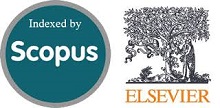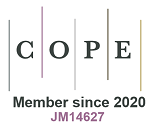The Complementary Effect between Private Consumption and Government Spending: Effect on the Economy
Abstract
This paper analyzes the relationship between final consumption and government spending, using the correlation and linear regression model. The objective of the research is whether government expenditures are complementary, substitute, or not related to private consumption to give positive effects on the economy. Methodology, quantitative secondary data were obtained from the World Bank, for five countries and processed with SPSS, 21. The empirical analysis was verified through, Bivariate and Partial correlation and normality test. The Result, first, shows that government spending complements and replaces final consumption. Second, it is also confirmed that even when interacting with other variables, the complementary effect of final consumption is not eliminated despite the shocks coming from government spending. Third, by adding other variables to the model, the issue of complementarity and substitutability of the two main variables is not lost. As a result, findings, confirm that private consumption (InCt) and government spending (InGt), Gross Savings (GS), and per capita income (GDPpc), are in statistically significant and positive relationships with each other. The novelty of the paper is, government expenditures cause an increase in private consumption is to high value, showing the complementary effect of government expenditures on private consumption. Based on health expenditures, education, public order, internet provided by the state have increased the demand of families for these services, causing an increase in the share of services provided by the private sector.
JEL Classification: E21; H5; E2; R0.
Full Text: PDF
Keywords
References
Barro, Robert J. “Government Spending in a Simple Model of Endogeneous Growth.” Journal of Political Economy 98, no. 5, Part 2 (October 1990): S103–S125. doi:10.1086/261726.
Fatás, Antonio, and Ilian Mihov. "The effects of fiscal policy on consumption and employment: theory and evidence." Available at SSRN 267281 (2001).
Linnemann, Ludger. “The Effect of Government Spending on Private Consumption: A Puzzle?” Journal of Money, Credit, and Banking 38, no. 7 (2006): 1715–1735. doi:10.1353/mcb.2006.0094.
De Castro, Francisco, and Pablo Hernández de Cos. “The Economic Effects of Fiscal Policy: The Case of Spain.” Journal of Macroeconomics 30, no. 3 (September 2008): 1005–1028. doi:10.1016/j.jmacro.2007.08.009.
Tagkalakis, Athanasios. “The Effects of Fiscal Policy on Consumption in Recessions and Expansions.” Journal of Public Economics 92, no. 5–6 (June 2008): 1486–1508. doi:10.1016/j.jpubeco.2007.11.007.
Chen, Yang, and Fushu Luan. “The Effect of Government Expenditure on Private Consumption: Evidence from China.” Journal of Global Economics 2, no. 3 (2014): 120. doi:10.4172/2375-4389.1000120.
Albertini, Julien, Stéphane Auray, Hafedh Bouakez, and Aurélien Eyquem. “Taking Off into the Wind: Unemployment Risk and State-Dependent Government Spending Multipliers.” Journal of Monetary Economics 117 (January 2021): 990–1007. doi:10.1016/j.jmoneco.2020.07.007.
Kwan, Yum K. “The Direct Substitution between Government and Private Consumption in East Asia.” University of Chicago Press, (2009).
Tervala, Juha. "Productive government spending and private consumption: a pessimistic view." Economics Bulletin 29, no. 1 (2009): 417-426.
Hok, Leanghak. "Non-Linear Effect of Government Spending on Private Consumption in Cambodia: Markov-Switching Autoregressive Model." Journal of Economics and Business 3, no. 1 (2020).
Zouri, Stéphane. “New Evidence on International Risk-Sharing in the Economic Community of West African States (ECOWAS).” International Economics 165 (May 2021): 121–139. doi:10.1016/j.inteco.2020.11.003.
Almosabbeh, Imadeddin Ahmed. “Is the Relationship Between Government Spending and Private Consumption in Egypt Symmetric?” Margin: The Journal of Applied Economic Research 14, no. 3 (July 31, 2020): 285–308. doi:10.1177/0973801020920096.
Dawood, Taufiq Carnegie, and John Nana Francois. “Substitution between Private and Government Consumption in African Economies.” Economic Modelling 73 (June 2018): 129–139. doi:10.1016/j.econmod.2018.03.012.
Kuncoro, Haryo. "The impact of government consumption on the private expenditures in developing country: the case of Indonesia." Business and Economic Horizons 14, no. 1 (2018): 1-16.
Galton, Francis. “On the Anthropometric Laboratory at the Late International Health Exhibition.” The Journal of the Anthropological Institute of Great Britain and Ireland 14 (1885): 205-221. doi:10.2307/2841978.
Legendre, Adrien Marie. Nouvelles méthodes pour la détermination des orbites des comètes: avec un supplément contenant divers perfectionnemens de ces méthodes et leur application aux deux comètes de 1805. Courcier, 1806. Available online: http://documents.univ-toulouse.fr/150BIN/PPN072489561.pdf (accessed on March 2021).
Balakrishna, N., and Chin Diew Lai. “Bivariate Normal Distribution.” Continuous Bivariate Distributions (2009): 477–561. doi:10.1007/b101765_12.
Pearson, Karl. “VII. Note on Regression and Inheritance in the Case of Two Parents.” Proceedings of the Royal Society of London 58, no. 347–352 (December 31, 1895): 240–242. doi:10.1098/rspl.1895.0041.
Gelman, Andrew, and Jennifer Hill. “Data analysis using regression and multilevel/hierarchical models.” Cambridge University Press, (2006).
Zuur, Alain F., Elena N. Ieno, and Chris S. Elphick. “A Protocol for Data Exploration to Avoid Common Statistical Problems.” Methods in Ecology and Evolution 1, no. 1 (November 13, 2009): 3–14. doi:10.1111/j.2041-210x.2009.00001.x.
Shapiro, S. S., M. B. Wilk, and H. J. Chen. “A Comparative Study of Various Tests for Normality.” Journal of the American Statistical Association 63, no. 324 (December 1968): 1343–1372. doi:10.1080/01621459.1968.10480932.
Rosekrans, P C, C J Meijer, A M van der Wal, C J Cornelisse, and J Lindeman. “Immunoglobulin Containing Cells in Inflammatory Bowel Disease of the Colon: a Morphometric and Immunohistochemical Study.” Gut 21, no. 11 (November 1, 1980): 941–947. doi:10.1136/gut.21.11.941.
Kent State University. “SPSS Tutorials: Pearson Correlation.” (2020). Available online: https://libguides.library.kent.edu/spss/pearsoncorr (Accessed on April 2021).
Shapira, Y., D. Y. Kenett, and E. Ben-Jacob. “The Index Cohesive Effect on Stock Market Correlations.” The European Physical Journal B 72, no. 4 (November 10, 2009): 657–669. doi:10.1140/epjb/e2009-00384-y.
Kenett, Dror Y., Michele Tumminello, Asaf Madi, Gitit Gur-Gershgoren, Rosario N. Mantegna, and Eshel Ben-Jacob. “Dominating Clasp of the Financial Sector Revealed by Partial Correlation Analysis of the Stock Market.” Edited by Enrico Scalas. PLoS ONE 5, no. 12 (December 20, 2010): e15032. doi:10.1371/journal.pone.0015032.
Baba, Kunihiro, Ritei Shibata, and Masaaki Sibuya. “Partial correlation and conditional correlation as measures of conditional independence.” Australian & New Zealand Journal of Statistics 46, no. 4 (December 2004): 657–664. doi:10.1111/j.1467-842x.2004.00360.x.
World Bank. "Western Balkans Regular Economic Report No. 18, Fall 2020: An Uncertain Recovery.” (2020). Available online: https://openknowledge.worldbank.org/bitstream/handle/10986/34644/153774.pdf (Accessed on March 2021).
Schiffbauer, Marc Tobias, and World Bank. "Western Balkans Regular Economic Report, No. 17, Spring 2020: The Economic and Social Impact of COVID-19." (2020). Available online: https://openknowledge.worldbank.org/handle/10986/33670 (Accessed on March 2021).
Dustatis. Statistiches Bundemsant (2020). COVID-19 leads to a decline in private consumption expenditure in 2020. Available online: https://www.destatis.de/Europa/EN/Topic/Economy-Finance/PrivateConsumption.html (Accessed on March 2021).
Keho, Yaya. “What Drives Energy Consumption in Developing Countries? The Experience of Selected African Countries.” Energy Policy 91 (April 2016): 233–246. doi:10.1016/j.enpol.2016.01.010.
Keho, Yaya. "Dynamic Relationship between Government Spending and Private Consumption: Evidence from Cote d’Ivoire." International Journal of Economics and Financial Issues 9, no. 1 (January 1, 2019). doi:10.32479/ijefi.7433.
Khan, Khalid, F. E. I. Chen, and Nadeem Ashraf. "Impact of government spending on private consumption using ARDL approach." Asian Economic and Financial Review 5, no. 2 (2015): 239-248.
DOI: 10.28991/esj-2021-01292
Refbacks
- There are currently no refbacks.
Copyright (c) 2021 Nakije M Kida







